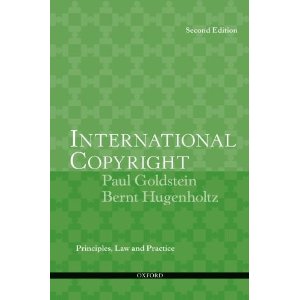 The reference International Copyright by Paul Goldstein and Bernt Hugenholtz (2nd Edition, Oxford University Press, USA; 592 pages) is a book for professionals involved with international intellectual property transactions or litigation. This volume covers all areas of international copyright law and practice from the Berne Convention to the TRIPs Agreement.
The reference International Copyright by Paul Goldstein and Bernt Hugenholtz (2nd Edition, Oxford University Press, USA; 592 pages) is a book for professionals involved with international intellectual property transactions or litigation. This volume covers all areas of international copyright law and practice from the Berne Convention to the TRIPs Agreement.
The first half of the book is dedicated to the principles of international copyright. There is a discussion of the rationales for copyright and the legal traditions that created the framework for more modern laws. The rules on ownership of rights developed out of moral rights and a basic sense of fairness but also for a larger purpose:
“Apart from their philosophical underpinnings, there is worldwide consensus that copyright and author’s rights advance the important goals of authorial autonomy and cultural diversity. The grant to creators of exclusive rights in their rights of authorship opens the door not only to reaping revenues from the work but in many cases to earning a livelihood. The universal rule that copyright protects expression but not ideas opens a second door, stimulating the production and dissemination of diverse cultural expression.”
While book covers various treaties and international copyright agreements, the book weaves together these agreements and how they relate to territoriality, national treatment of copyright, subject matter jurisdiction and conflict of laws.
The second half of the book is a complete overview of substantive copyright law and neighboring rights. A detailed discussion if provided for various classes of copyrightable subject matter, authorship, ownership, term of protection, economic and moral rights as well as exemptions, statutory licenses and limitations on exclusive rights.
There is also a section on copyright enforcement and remedies for infringement”
“Coercive remedies are an essential weapon in a copyright owner’s litigation arsenal. In many, if not most, cases, a court order enjoining further infringement will better to serve the right holder than ex post compensation for damages following a (sometimes protracted) judicial proceeding on the merits of a case. Coercive remedies range from temporary injunctions, to measures to preserve evidence granted in ad interim procedures, to more permanent remedies issued as part of a final judgment in a case.”
We recommended this book for anyone interested in international copyright law and practice.
About the Authors
Paul Goldstein is the author of an influential four-volume treatise on U.S. copyright law and a one-volume treatise on international copyright law, as well as leading casebooks on intellectual property and international intellectual property. He has authored seven other books including two novels devoted to intellectual property themes, Errors and Omissions and A Patent Lie. Professor Goldstein currently serves as of counsel at Morrison & Foerster in their intellectual property group and a professor at the Stanford Law School.
Bernt Hugenholtz is Professor of Intellectual Property Law and Director of the Institute for Information Law of the University of Amsterdam (IViR). He has written numerous books, studies and articles on a variety of topics involving copyright, information technology, new media and the Internet.
International Copyright by Paul Goldstein and Bernt Hugenholtz (2nd Edition, Oxford University Press, USA; 592 pages) is available through Amazon.



[…] Patent Baristas […]
[…] This post was mentioned on Twitter by PRO Legal and PRO Law, A Books Blog. A Books Blog said: RT @patesalo_e: Book Review Moday: International Copyright – Patent Baristas http://paten.to/dEXq2d http://is.gd/9uzCpE […]